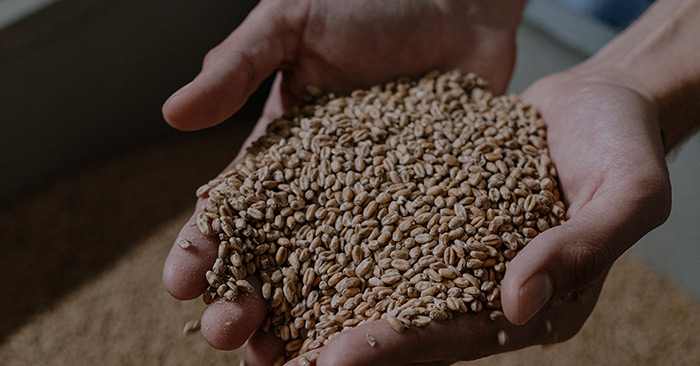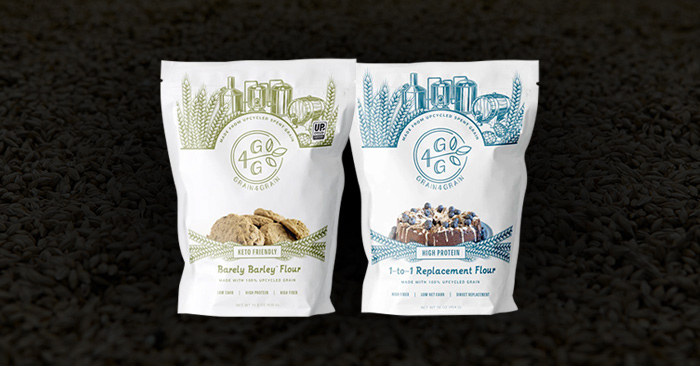Upcycled Ingredient Makers Eye Brewer’s Spent Grains

Regenerative food companies are using a mix of environmental messaging and economic incentives to convince brewers and grain processors to adopt upcycling technology as a means of repurposing spent grain into human food production.
As sustainability becomes a greater concern for consumers and companies, spent grain offers a versatile, abundantly available ingredient. Suppliers are looking to partner with CPG brands to produce finished goods with the aim of maximizing profits, efficiently growing consumer adoption and educating the broader industry on the benefits of using the protein-rich byproduct.
But while that may be appealing to upcycled food advocates, convincing brewers, food makers and agricultural processors to get on board is proving to be a harder sell. In order for the opportunity to be fully realized at scale, upcycling spent grain – which typically ends up being fed to livestock like cows and pigs – will likely need to become more cost effective.
The Spent Grain Opportunity
Brewer’s spent grain (BSG) is made up of barley, wheat, malt and other grains that have been soaked in hot water to release the sugars and create the wort that provides the initial stage of beer brewing. The leftover organic matter is rich in protein and high in fiber content.
According to the USDA’s National Institute of Food and Agriculture, approximately 202 million barrels of beer are produced domestically per year creating a byproduct of 4.7 million metric wet tons of nutritionally potent grain.
Presently, the majority of BSG goes to feed livestock – about 90%, according to a Brewers Association internal survey of its members – or is composted.
Beer conglomerate Anheuser-Busch InBev stepped into the upcycled industry in 2021 by investing in BSG ingredient supplier EverGrain through its ZX Venture arm. The company sees upcycling BSG as a way to meet sustainability goals by repurposing upwards of 1.4 million metric tons of spent grain while also finding additional revenue streams for its waste through EverGrain.
In June, EverGrain officially opened its production facility in St. Louis, Missouri and launched its flagship barley protein product, EverPro. It also recently announced it had formed a scientific advisory board to further investigate the health and sustainability impact of BSG. EverGrain’s ingredients are already used in a variety of food and beverage products such as Nestle’s Garden of Life and Airship’s Cold Brew Coffee, as well as an array of plant-based protein and supplements companies.
“Being an ingredient company within one of the world’s largest brewing companies gives us the capability to scale production of upcycled barley grain – what we at EverGrain affectionately call ‘saved’ grain – around the globe,” said EverGrain founder and CEO Greg Belt in a press release.
Yet, AB InBev has seen some challenges to its upcycling endeavors.
Having undergone multiple iterations and attempts to capture market share, AB InBev-backed upcycled barley milk brand Take Two (originally Canvas) came to an abrupt end in May when it was announced it would be shutting down operations. The company came out of AB’s Zxelerator program in 2017 and was originally meant to be a plant-based platform brand for the beer giant’s EverGrain business before it shuttered.
AB InBev might be the biggest beer company to invest heavily in upcycling but it is not the only one. In 2018, Molson Coors partnered with Tyson Meats to help create ¡YAPPAH! protein crisps from upcycled chicken and spent grain.
Smaller food companies have also been playing in the upcycled BSG category for years. Both Grain Elevator and the Upcycled Grain Project used BSG to make snack foods. Danish company Agrain has created a line of baking products from upcycled beer and whiskey production.
CPG Merely A Means To An Upcycled End
As the market has evolved, several companies working in the space have shifted strategy to focus on becoming ingredient suppliers rather than full-fledged CPG brands.
Upon launching, early adopter Upcycled Foods, Inc. (formerly ReGrained) was focused on creating snack bars made from BSG. In 2016, the company partnered with the USDA on a research project to make an efficient drying technology and eventually patented the technology in 2019 with the release of its SuperGrain+ flour. After launching its own CPG products using SuperGrain+, to varying degrees of success, Upcycled Foods is now focusing on building itself into an upcycled ingredient provider.
Similarly, San Antonio, Texas-based Backcountry Mills saw an opportunity in creating an efficient technology to dry and mill BSG into new food products. The company initially launched a line of CPG pancake and baking mixes through its Grain4Grain brand but is now trying to position the company as an ingredient supplier.

At the time of the business’ conception, Backcountry Mills co-founder Yoni Medhin said upcycled BSG products were “cost-prohibitive” to manufacturers. Taking his experience of working in oil and gas, Medhin’s goal for Backcountry was simple: “To produce an upcycled ingredient at the lowest cost so you can eventually commoditize it and make it this very available, portable, and mainstream.”
The long term plan has always been to build consumer awareness around a CPG product platform, allowing the company to partner with large brewers to produce upcycled ingredients at-scale for the lowest possible cost, Medhin said. Then, with a supply chain established, Backcountry would turn to selling this ingredient to others.
The company invested money into a larger facility to not only prove out the concept further but to build up its wholesale business. Now, Backcountry has three bulk customers including Texas supermarket chain H-E-B which uses the upcycled food company’s flour in some of its bakery products.
“I saw that there was so much of this byproduct out there, that if somebody could just take even 1% of the supply – which is a lot – there’s enormous value creation for the actual producers of the byproduct. They get a huge revenue stream out of that,” Medhin said.
Brewers who currently send BSG to livestock farmers often do not realize profits from the waste product. In fact, many small-to-midsize brewers give the product away for free as long as the spent grain is picked up and transported by the farmer. Brewers who can’t make a little revenue from selling BSG to farmers, see value in saving on waste removal charges of bringing the water-laden byproduct to landfills.
Medhin offers local farmers located in a 100 mile range of his San Antonio production facility around three times the going rate per pound that farmers pay for BSG (if they don’t take it for free).
“It’s essentially still pennies on the dollar on our end, but it’s still something for them,” he said.
Moving forward, the company hopes to partner with large manufacturers to build processing operations very close to or within production facilities to create an even better cost-reduction model that also offers revenue-sharing of the upcycled ingredient. A co-located model would also bring the price-point down for Backcountry, increasing profit margins at the same time as building out a larger impact on the amount of BSG upcycled.
Widespread Adoption Constrained By Brewers And Consumers
In fact, many breweries say that disposing of BSG is not a huge problem and upcycling might even further complicate the systems already in place.
Feeding livestock BSG is a solution that’s worked for thousands of years representing a symbiotic relationship between farmers and brewers. Not only does it make sense economically but it is a much easier process.
“For brewers, that typically represents a real revenue-neutral solution, or possibly even makes them a little bit of money,” Skypeck said. “It’s a return on investment question.”
Convincing breweries to adopt upcycling requires a buy-in that has to be both economically beneficial and provide a competitive advantage in the market. When done in-house, turning BSG into a food product needs to be done quickly and in accordance with FDA regulations. BSG is made up of about 80% to 90% water, making it highly expensive to transport and quick to spoil (there is about a 24- to 36-hour window before the product is unusable for human food production).
Repurposing the BSG “takes time, takes labor, takes space. And more importantly, it takes a lot of energy to dry that grain and, for smaller members, that’s an inefficient operation,” Skypeck said. “I feel comfortable saying generally it’s not an industry issue.”


















